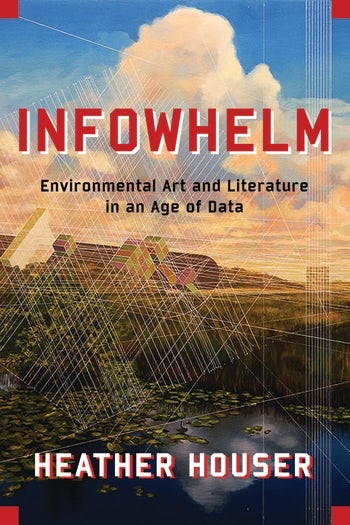"Infowhelm" with Former Fellow Heather Houser

Heather Houser served as a Tanner Humanities Center Visiting Research Fellow in 2018 -2019 and is an Associate Professor in the Department of English at the University of Texas at Austin. In her new book, "Infowhelm", she explores the ways contemporary art manages environmental knowledge in an age of climate crisis and information overload.
Q&A With Heather Houser
I’m trained as a literary scholar. I've focused on contemporary, mostly American literature
since I was a graduate student and have continued with that as an area of specialization.
In my graduate work, I started to focus on environmental representation in American
fiction of the last several decades, and then expanded that interest to include visual
culture, popular culture and American culture. How does it represent our values around
nature, our relationship to nature, the pressing environmental issues? I tend to focus
less on texts that are more on the nature appreciative side and try to think through
dilemmas like climate change or toxic pollution, or extinction. So how do we represent
those phenomena which can feel intangible or just distant or overwhelming? And how
does literature and other culture really help us reorient our relationship to nature
and present solutions or at least perspectives on these problems?
This project is an extension to some extent on my first book, which had a focus on
environmental health. As I was finishing that book, I reflected on how much data we
consume around environmental issues and the emotions of data. I had this strong interest
in data visualization, that would show up on Twitter, or The New York Times and USA
Today. All of these visualizations out there, and how it was contributing to this
overwhelming data that you don’t know how to process. And that was what brought me
to this project - the emotions of data and how we as media consumers and cultural
consumers have to navigate that and how the literature and culture is doing that for
us.
I feel like most of the book is about these double edged phenomenon. On the one hand,
the book is not anti-science, but nor is it totally different to science, that it
is thinking about the importance of cultural understanding and identity and all of
these things in addressing environmental challenges. We are overwhelmed many of us
and maybe in states of despair, or apathy in the face of some of these overwhelming
challenges, but there are many things that many of us can get purchase on because
of all of the information out there. So the book has three parts. The first part is
about climate data and modeling, and analogies and metaphors. And in each of those
cases, like I think there are critiques of all of those things that I'm interested
in, like, the way that we get so much information through satellite imagery, and surveillance
capitalism. There's a lot of these things I write about have these double edges.
We can come up with maybe good solutions to environmental challenges, like climate
change. But all those good solutions are only going to look good for certain parties.
We have to take them out of a technocratic framework and put them into more humanistic
frameworks. Okay, this looks good from this balance sheet or in this part of the world
or in this neighborhood, but how does it look over here in a population, maybe that's
been under served or who's been harmed by years and years of racist planning or displacement
or whatever it might be? Questions of also what activates us as human beings to care
about a problem? Especially a problem far away from us or maybe not as immediate to
us or maybe immediate to us but we just haven't seen you know, the angle that makes
it immediate to us. The raw data can leave us with a shock response, but it doesn't
necessarily have us dwell, I think there's something about like dwelling, that makes
you pause and think and, and situate what you're seeing.
I have virtually moved to Austin, Texas, where I am the new Associate Director for Research at the Harry Ransom Center at the University of Texas at Austin. COVID-19 has pushed my transition virtually until I can safely move. Another shout-out: I am fortunate to be new colleagues with former Tanner fellow, Heather Houser (who has a book forthcoming from Columbia University Press on Infowhelm: Environmental Art and Literature in an Age of Data -- it was part of her fellowship at the Tanner Center -- everyone should check it out!). Georgetown Medical School's Arts and Humanities Program recommissioned my opera on the climate crisis, Cassandra in the Temples (originally premiered at MIT, with the libretto published in the U's Western Humanities Review) to celebrate their 30th anniversary in Fall 2020, and I continue to follow Great Salt Lake's tar seeps, Land art, and collaborative stewardship.
We are immersed in information, in data and it is bound up in our identity. It is bound up in the narratives in which we’re situated; it is bound up in all of these emotions. One of the important takeaways for me is, we need to understand information and data in that way. We need to look to the arts and the humanities and culture more generally to help understand how information becomes meaningful to us, and how it can spur new narratives, and new relationships to the environment.
